education
PSL - Albuquerque - April 2013
30.04.13 - 22:20 - Filed in: Education

“If you never cry your eyes get all dirty, and you can no longer see” - Jerry Weinberg
There is no use asking for specifics about what is done at PSL because it might be the wrong question. PSL is an introspection into oneself, a mirror and individual thinking and processing.
more to come later...
Heroin for Testers Injected by 140 Characters, and why it Is Sometimes Good for You
28.02.13 - 20:50 - Filed in: Software Testing

image credit: http://j.mp/XFQ1PS
Zounds! What a menacing title, you might think. Yes, I am fishing for effects and the word “Heroin” always appears to do the job. And so does “Fuck”, “Motherfucker”, “Fuck you!” and “Fuck it!”. “Cunt” isn’t bad neither.
As a freethinking European I find it amusing when you desperately hide these words behind tiny asterisks like “F*ck” or suggestive ellipses like “F…”. Come on, prude people, get a life! None of you has a problem spelling the word “kill”, do you? Fucking is pure pleasure, killing is not. What’s wrong with you people?
Admittedly, fucking is not the topic of this post, but after the highly screened and politically correct ebaytechblog post, I am gasping for some “political incorrectness”-air. So - if you allow me - fuck you all!
The topic is Twitter and its importance to the context-driven community. As I see it there is the twin fix of Twitter and Skype that do the job. They both keep the network connections alive. Twitter plays an important role in the dog-sniffing activities of the people in the context-driven world. Some friendly hellos, fervent fights about semantics and an abundance of pleasurable disputes and useful links.
Whenever there is a need to either take the discussion offline or elaborate on something more in-depth, Skype is the tool of choice. I have had many good discussions both on Twitter and Skype. All good so far.
Only that there is a problem here: Twitter is a terrible attention grabber and temporarily transforms - well, I don’t know about you, but it certainly does it to me - people into ADHD victims. In the course of a day there are countless checks on new tweets and there always is a strong urge to engage in discussions.
That is not very good when you should work on longer term projects, such as preparation of a conference presentation. One’s own vainness is also in the way of many things. It is flattering if your tweets are re-tweeted or favored by your followers.
I did an experiment today. My thought was: What kind of tweet would generate the most re-tweets? It certainly had to be crispy and short, unexpected, funny and unusual. This is the tweet I came up with:
QA = Questioning Assumptions
It produced a good number of re-tweets and marks as favorites. But why would this be important? I don’t know.
Still, Twitter plays an important role in maintaining the relationships between the context-driven testers. It is just a great experience to meet some of my Twitter friends physically at conferences. It is like meeting old friends you have never met before.
Semantical discussions on Twitter tend to generate a common view on the meaning of things. Twitter has a tremendous power to make thinking better and have people experience deep learning.
The one thing I have not yet figured out is how to actually handle Twitter in order for it to not rob a significant share of my time. I’d be very much interested in how you keep the balance of sanity.
Truthfully yours,
Ilari
We Attended Rapid Software Testing because we Want to Grow our Testing Skills at eBay
07.10.12 - 18:37 - Filed in: Software Testing

For the second time this year, James Bach came to Switzerland. After having had one of the Keynotes at Swiss Testing Day in March (see the recording here) and spending time with me on solving puzzles, intensive discussions on testing and reviewing Skype coaching transcripts (see my previous post here), it was time for Rapid Software Testing at eBay.
As usual, James arrived in Switzerland a few days earlier in order to re-balance his jet lag. Knowing that James loves the mountains, I just had to show him Jungfraujoch, which is a spectacular ride on the train and also the highest train station in Europe. We walked on ice and worked out a graphical proof of the addition of ascending odd numbers starting with 1 being n^2 for n being the number of odd numbers added. (Send me your solution, if you feel inclined to solve it graphically)
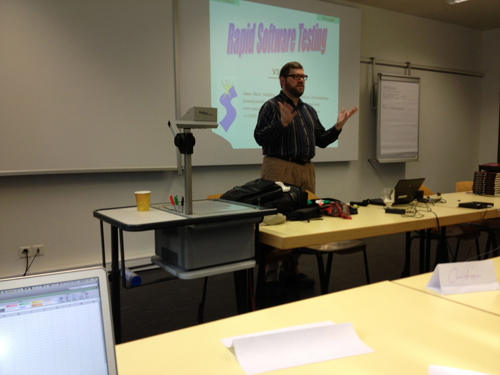
We at eBay International are a team of 13 testers. As we also wanted to connect with other testers, I extended my invitation to RST to other testers within the eBay family. The enthusiasm level was high and we ended up being 24 people from eBay, marktplaats.nl, mobile.de, brands4friends.de, tradera.se, dba.dk and two developers from eBay, who all found it important enough to spend 3 full days on software testing education.
James jumped right into getting our brains to work with an assignment on how to test font sizes in Wordpad. Appears to be a straightforward task until you spend some time thinking about it. What exactly are sizes of fonts? How do you measure them? On paper? On the screen? What screen? Is it even relevant for Wordpad? How relevant? Good testers immediately start with asking questions.
“If you talk about the number of tests without specifying their content, the discussion becomes meaningless” -- James Bach
Many of the exercises and ‘hot seat’ situations exemplified, that software testing is a demanding and intellectually challenging activity. The hot seat situations consisted of one participant being engaged by James into solving a task. This was tough, since James is very skilled at spotting inaccurate thinking. And once he has done so, he is in your face and all over you. One needs to have nerves of steel in order to successfully navigate through the traps set by James; and the eBay testers mostly proved worthy.
As much as one needs good technical understanding in software testing, there are other qualities equally important. An exercise on ‘shallow agreement’ - a state where you believe that you are talking about the same thing - demonstrated, how important the clarification of assumptions is in software testing.
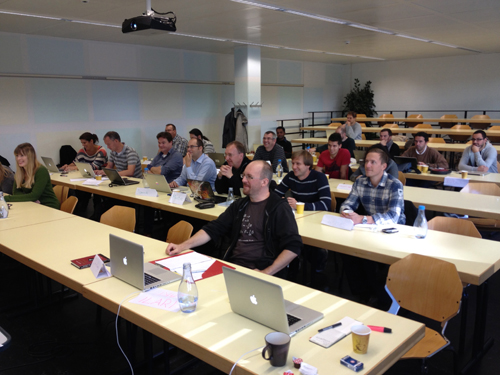
And why can’t you just automate everything? Simple reason: you can only automate what you know (and even in that category, most would be impractical since of the costs involved to automate it would be too high).
In non-human systems there is a fundamental absence of peripheral wisdom, which is what allows collateral observation. Humans are very good at detecting violations of expectations they did not even know they had. Does that sound obscure? Talk to me on Skype (ID: ilarihenrik) and I can show you with an exercise.
I am very happy that we had the opportunity to spend 3 full days on deep and active reflection on software testing. It is important to acknowledge, that software testing consists of more than just writing scripts and fiddling on automation frameworks. A skillful tester chooses his/her tools according to the needs presented by the testing challenge, and not blindly by following some imaginary ‘best practices’.
Two areas I will focus on with my team in the near future: modelling and reporting. Modelling for its necessity to grasp the complexity of a big system like eBay, reporting out of the need to be able to explain what we do. You not only need to be good at testing but also at explaining what you do. A good report should give an accurate impression on what I as a tester did during the period I tested.
I believe it would be a good idea if more executives in large companies attended Rapid Software Testing. It might clarify some of the misguided assumptions on what software testing is all about.
What you Can Do if your Brain just Refuses to Understand
04.04.12 - 18:41 - Filed in: Software Testing

image credit: http://j.mp/HcxgtA
If you don’t live in a box shielded from everything I am sure this has happened to you: You tried to understand something and your brain just doesn’t get it. This may be uncomfortable for a context-driven tester as learning new things is quite essential to being context-driven.
There is a fabulously simple solution: Just give up
Assuming that you do not see this short and easy solution as a fit for your character disposition I guess we would have to go on with a longer elaboration.
Now, a common misconception is that your brain works like a hard disk. Here data, there hard disk, file -> transfer. And voilà, you’re set. Just not so.
If you don’t get something, then the following happens: As soon as your brain gets input the synapses start to fire happily their little electrons and look for pre-existing structures to attach your new input to. But in this case there just isn’t any place to be attached to because the input is new and different and weird and difficult and doesn’t quite fit anywhere. Then your brain becomes sad. No place to go. The new input is like sand in your hands. Your brain just lets it trickle through. And lost it is, but not forever.
Give yourself time
Think hard, then sleep, then wake up and get the solution for breakfast. Our brain acts in mysterious ways. We are not general statement solvers that always evaluate an input to a correct solution right away
Go for a walk and continue thinking
There is a whole thought school on walking and thinking called Peripatetic School. It originated with every tester’s old friend - Aristotle. Follow the link and read about them.
And with walking comes fresh air and you have the liberty to choose a good discussion partner and decide on where you want to walk. Isn’t that cool?
Not only the greek liked walking and thinking, Rousseau liked it, too. He might have had the idea from the greeks, though. But who cares where something comes from if it works.
Go ahead and try it out. Solutions may come flying towards you. Then you just need to catch them."I can only meditate when I'm walking. When I stop, my mind ceases to think; my mind only works with my legs." Jean-Jacques Rousseau
Visualize
Don’t just brood over something until your brains starts boiling. Extend yourself, take your hands and draw your problem. Make it visible. Look at it. Draw again. You “see” the great feedback loop you just created?
There are different forms of thinking. You are most likely to face problem solving in a verbal fashion. You just juggle words in you head and you try to sort them. But there are other, non-verbal forms of thinking, which are:
- musical
- kinesthetic
- mathematical
- visual
Anyway, visualization may greatly help with your thinking process.
Have a whiteboard/flipchart/blackboard close to you
That would be the preferred space to visualize. Their size helps you to get your problem “in your face”. It just pushes at you until you see a path through the jungle.
Discuss with friends
Explain your problem to a friend and get him/her involved in a lively discussion. The best discussion partner would be somebody with whom you tend to disagree. They obviously understand the world differently, otherwise you wouldn’t be quarreling constantly.
Just do
How much do you really need to understand to at least start with something? As mentioned in a previous post, true mastery comes through practice. Just start with doing and understanding will follow.
Prepare a presentation and talk to people about it
Take something completely new and unintelligeble to your mind and start making a presentation. Guess what, you learn with ultra-sonic speed. The outside pressure keeps you focused.
Write down what exactly you do not understand
Again a neat little feedback loop. Writing is reading your thinking. You might want to use the Phoenix Checklist. Search on the engine of your choice and you will quite easily find it.
AND MOST IMPORTANT:
Learn to feel comfortable with not understanding
You don’t need to fully understand everything. At least not immediately. If you want that, you will always remain in your comfort zone. The comfort zone is a very dangerous area. It is the little brother of mediocrity. Who has the aspirations to be mediocre? Anybody?
A little tautology here: Difficult things are difficult. If you don’t learn to be comfortable with the slow process of understanding difficult things, you most likely will abandon your pursuit of greatness. It doesn’t just happen overnight. You need to work for it. Start today.
(And tell me in the comments below how you face your difficult understanding problems, I am very much interested in how YOU do it)
James Bach and how I Enjoyed his Visit to Switzerland
22.03.12 - 20:36 - Filed in: Software Testing
Some weeks are boring, some weeks are frustrating, some weeks are just regular. But once in a while there is a week filled with exitement, learning opportunities, joy and intellectual challenges. I am a lucky guy because I happen to have lived such a pleasurable week recently. James Bach came to Switzerland for the first time.
His flight was coming in from England where he attended several appointments in Cambridge. I was waiting for him to exit into the arrival hall. As expected it took not long for James to drop a puzzle bomb on me. It goes as follows:
Question: What is the sum of x + y, what is the product of x * y and what are the values of x and y
A hint: It is possible to solve it by the sole use of your brain, a sheet of paper and a pencil
IMPORTANT: Please do not leave the solution in the comments below
While driving James to his hotel I tried if there was a simple solution to the puzzle but I could not find one so I decided to attempt to solve it as soon as I got home. Also, it is not such a good idea to try to solve puzzles while driving.
In the hotel we had some more testing discussions before James retired to his room and I was very eager to get back home to solve his puzzle. I think I was on a good path towards the solution but I decided to give me a break because I was stuck somehow.
Interesting enough, the brain seems to have its playful free time during sleep. My brain decided to wake me up at about four a clock in the morning giving me a hint about how to solve it. I decided to get some more sleep and just took some notes on the general idea. Later in the morning I solved the puzzle which made me kind of proud. Tricky one, this one!
Sunday afternoon I picked up James from his hotel and we strolled through Zurich while he entertained me with a lateral thinking puzzle involving a waste dump. Again I enjoyed it very much and it gave me the appetite for the dinner. James is very good at challenging your thinking.
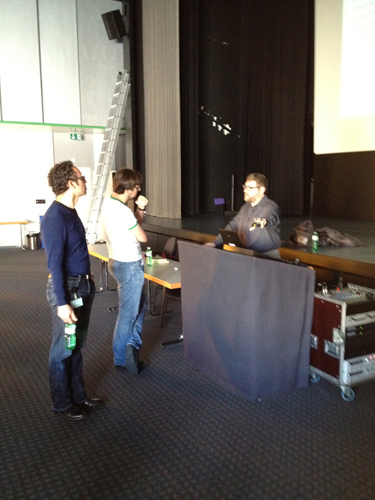
Monday morning we took the train to my workplace Phonak AG, where James spoke all day about tester self-education and did many puzzles with the audience of about 50 people. The astonishing thing was that there were more developers present than testers. What a great success for software testing. Developers become more and more interested in what we do. We testers have won! (Just joking, I love you all, dear developers)
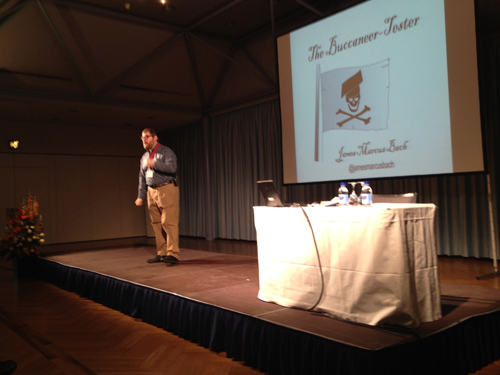
This year’s Swiss Testing Day saw an amazing record breaking number of 800 participants. James had the first of the keynotes in the morning (you may see the video here) and I hope he inspired many testers to become interested in the context-driven school and self-education. I expect to see more Swiss testers working on their reputation in the future.
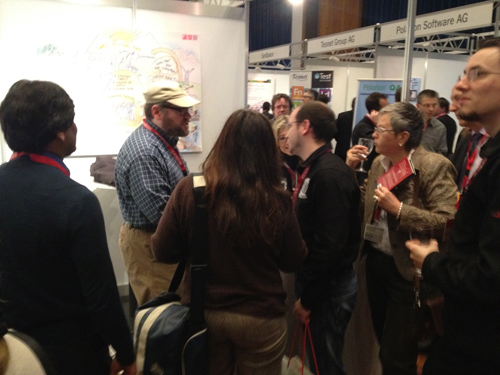
We sold James’ excellent book Secrets of a Buccaneer-Scholar at our conference booth and every 10th person at the conference bought a copy. That, too, gives me hope that there are more context-driven people in Switzerland. If you - dear reader - are one of them, please contact me immediately. I want to get to know you and talk to you. James talked all day to many people, there were dice games and his hand must have been tired from all the book signing.
Thursday was a work day, we went through some of my Skype coaching transcripts and James gave me a lot of valuable feedback. We did that in one of my favorite coffee shop/book store Sphères in Zurich. It is the perfect place for productive work.

Friday came and James was very eager to learn about Swiss cheese. We drove to Engelberg where there is a public display of cheese making located in a monastery. In the middle of a room there was a kind of glass igloo where a cheese maker was doing his stunts while the visitors pressed their noses flat on the outside. A bit like in a zoo, but without animals.

In Engelberg we found the wonderfully victorian Hotel Terrace from where we had a beautiful scenery of mountains. Again we went through more coaching transcripts and tried to identify patterns.

After coming back to Zurich, we ended our day with a dinner at the Prime Tower on the 35th floor and challenged each other with some more lateral and mathematical puzzles. James also made fun of me because I was eating my hamburger with fork and knife. See, that’s us Swiss people behaving at a fancy restaurant. Anyway, great day, but then we were both tired at the end. It was like in Monty Python’s “Just a thin mint”-scene (Caution: this link is not suitable for the faint-hearted), one more puzzle and my brain might have exploded.
James headed off to Stockholm on Saturday, I said good bye at the airport and I hope he comes back to Switzerland soon. You’re always welcome, my friend.
BTW: Here is the link to James’ view on his visit to Switzerland.
His flight was coming in from England where he attended several appointments in Cambridge. I was waiting for him to exit into the arrival hall. As expected it took not long for James to drop a puzzle bomb on me. It goes as follows:
- You have a range of integers from 2-180
- Two integers x and y are chosen from the range (x and y may be equal or different)
- A person A is given the sum of x + y
- A person B is given the product of x * y
- First, person B says to person A: “I don’t know your sum”
- Then, person A says to person B: “I already knew that you do not know my sum”
- To which person B replies: “Now I know your sum”
- And then person A says: “And now I know your product”
Question: What is the sum of x + y, what is the product of x * y and what are the values of x and y
A hint: It is possible to solve it by the sole use of your brain, a sheet of paper and a pencil
IMPORTANT: Please do not leave the solution in the comments below
While driving James to his hotel I tried if there was a simple solution to the puzzle but I could not find one so I decided to attempt to solve it as soon as I got home. Also, it is not such a good idea to try to solve puzzles while driving.
In the hotel we had some more testing discussions before James retired to his room and I was very eager to get back home to solve his puzzle. I think I was on a good path towards the solution but I decided to give me a break because I was stuck somehow.
Interesting enough, the brain seems to have its playful free time during sleep. My brain decided to wake me up at about four a clock in the morning giving me a hint about how to solve it. I decided to get some more sleep and just took some notes on the general idea. Later in the morning I solved the puzzle which made me kind of proud. Tricky one, this one!
Sunday afternoon I picked up James from his hotel and we strolled through Zurich while he entertained me with a lateral thinking puzzle involving a waste dump. Again I enjoyed it very much and it gave me the appetite for the dinner. James is very good at challenging your thinking.

Monday morning we took the train to my workplace Phonak AG, where James spoke all day about tester self-education and did many puzzles with the audience of about 50 people. The astonishing thing was that there were more developers present than testers. What a great success for software testing. Developers become more and more interested in what we do. We testers have won! (Just joking, I love you all, dear developers)

This year’s Swiss Testing Day saw an amazing record breaking number of 800 participants. James had the first of the keynotes in the morning (you may see the video here) and I hope he inspired many testers to become interested in the context-driven school and self-education. I expect to see more Swiss testers working on their reputation in the future.

We sold James’ excellent book Secrets of a Buccaneer-Scholar at our conference booth and every 10th person at the conference bought a copy. That, too, gives me hope that there are more context-driven people in Switzerland. If you - dear reader - are one of them, please contact me immediately. I want to get to know you and talk to you. James talked all day to many people, there were dice games and his hand must have been tired from all the book signing.
Thursday was a work day, we went through some of my Skype coaching transcripts and James gave me a lot of valuable feedback. We did that in one of my favorite coffee shop/book store Sphères in Zurich. It is the perfect place for productive work.

Friday came and James was very eager to learn about Swiss cheese. We drove to Engelberg where there is a public display of cheese making located in a monastery. In the middle of a room there was a kind of glass igloo where a cheese maker was doing his stunts while the visitors pressed their noses flat on the outside. A bit like in a zoo, but without animals.

In Engelberg we found the wonderfully victorian Hotel Terrace from where we had a beautiful scenery of mountains. Again we went through more coaching transcripts and tried to identify patterns.

After coming back to Zurich, we ended our day with a dinner at the Prime Tower on the 35th floor and challenged each other with some more lateral and mathematical puzzles. James also made fun of me because I was eating my hamburger with fork and knife. See, that’s us Swiss people behaving at a fancy restaurant. Anyway, great day, but then we were both tired at the end. It was like in Monty Python’s “Just a thin mint”-scene (Caution: this link is not suitable for the faint-hearted), one more puzzle and my brain might have exploded.
James headed off to Stockholm on Saturday, I said good bye at the airport and I hope he comes back to Switzerland soon. You’re always welcome, my friend.
BTW: Here is the link to James’ view on his visit to Switzerland.
Reacting on a Previous Comment on what "More Knowledge" or "Being Better" Means in the Context of Software Testing
24.02.12 - 22:26 - Filed in: Software Testing

Q1. Can I write a blog post that is inspired by a comment on a previous post?
Q2. Can I name the person whose comment inspired me?
Ethical questions these are. And fortunately they are quite straightforward to handle:
A1. Now that is the beauty of being in charge: I can do whatever I please here in my hood.
That would be a YES.
A2. This one’s trickier: If I had a comment by someone I know but who preferred to stay anonymous in her/his comment, then probably no. If the commenter has stated his real name, has a picture of himself as an avatar and will be stated as an example of asking a very good question, then with high probability YES.
Who is it? Who is it? What’s the question? What’s the question? It is my friend Jesper L. Ottosen from Denmark and his question on the previous post was:
Where is the semantic definition of the ">" operator, it seems it operates on "k" functions? In layman's terms: how do you determine "more knowledge"?
First of all I would assume that within our context-driven family there is a consensus on that there is no such global thing as “more knowledge”. Let’s explore some dimensions:
People Skills/Supporting the Team
I put this first. Not just so, but because I believe that testers who do not have a sensorium for the necessity of interpersonal skills will never achieve anything of long term value in organizations that are inherently built on team work. And team work means - well - working together.
Test Techniques
Now, this might create the impression of being a parrot who is able to list the names of test techniques as they are requested by some multiple-choice questionnaires . That’s not what I mean. What I mean is the ability to approach a testing problem with the mental tools necessary to solve a problem. Which leads to the next dimension:
Problem Solving
There are (at least) two fundamentally different areas of problem solving. First: At school where the problem might be served as a well defined question and might sounds like this: “How long was the Thirty Years’ War?” The answer to that question would be: “30 years”. Problem solved. Second: “Test this!” Answer: Well, there is no answer to that. There are just many more questions that need to be asked. Or in other words: The problem field is only fuzzily defined. You need to find a way to make sense of it. And you don’t get 10 points for a correct answer neither.
Software Development Abilities
No, it is not a disadvantage if you know how to code. But that’s something you already know. And one shouldn’t use double negatives. They take more time to interpret and are error prone on the sense making side. [Refactoring the sentence]: Yes, It is an advantage if you know how to code.
Fast Learner
I was recently asking myself if there is a correlation between fast learning and general smartness and it took me virtually no time to decide that: Yes, there is a correlation. In what way does smartness help being a better tester? Well, if you learn fast, you may use your learned content faster to do testing. And if you do testing sooner, you start to find bugs sooner. Actually not only sooner, but you actually find them based on your knowledge you just acquired. If you’re not a fast learner, you might miss them completely.
Creativity/Lateral thinking
Get your lateral puzzles rockin’ your brain cells. It creates agility on your ability to come up with good tests. And good tests of course find good bugs. Obvious, isn’t it? Now, go and find instances where this is not true. Or only half true. Or something completely else. Turn it upside down and then back again. What do you have now? Did you follow me? If so, can you explain?
Good Observer
Some time back I bought new glasses. One of my testers immediately noticed. He was the only non-glasses-wearer who noticed. (People who wear glasses seem to notice more often if somebody else wears new glasses). He does not only notice glasses, he notices a whole lot of good bugs in our product. He is a good observer.
Explaining/Teaching others
That is an ability you should either have yourself or if you don’t have it, then you have to fly in James Bach or Michael Bolton.
Inspire others
This one goes very much with the first category, the people skills. Testers who are able to inspire other testers to become better at what they are doing, are very valuable team members.
Curiosity
Don’t click here.
Experience (Been in the business for some time)
Ever heard of the 10’000 hours rule? It states that if you deliberately exercise something for 10’000 hours you get really good at it. Ok then, let’s do some 10’000 hours of testing.
Reader of Books & Comics
Can it be that readers of books & comics are just better testers? Who knows, it might be true. And I am sure I have a scientific study somewhere here that confirms my theory - let’s see….hm, just cannot find it right now. I am sure it is somewhere.
Resistance to Stress
If you’re resistant to stress, your heart keeps on beating instead of attacking you in the middle of a test cycle. Having a heart attack makes testing really hard. I put this in the “knowledge” section because handling stress can be learned.
Resistance to Stupidity
You know it when you see it. My take on this is that humor helps a lot. People should nevertheless have a finely tuned bullshit barometer in order to detect it in a timely manner.
So, whenever you employ new members to your team, I would recommend to test them on the dimensions above. And please, tell me your dimensions in the comments below. Thanks.
The Uomini Universali Were the Cool Cats of Literature Lecture
23.01.12 - 21:43 - Filed in: Software Testing
Try this: Go buy any new book. Then de-shrink-wrap it (i.e.: remove the book from its enveloping plastic awfulness). Place the book in front of you. Take it in your hands. Open the book somewhere. Meditate for a second. Then put your nose deep into the book and inhale.

Now comes the triage part. What is your reaction to that proposal? (mark your selection with a check mark)
If your answer was similar to 1. then stay with me and keep on reading. If you feel more intimate with answer 2. then you will probably stay with me anyway because you are a book lover and like to read.
It is amazing how many people in software testing have not read one single book on software testing. Or have even hardly read anything at all. Mostly the reason given is lack of time. But that is simply not true. Nobody can have lack of time because the flow of time is just as it is. There is no such thing as “lack” of it. It is 24 hours every single day. No deviation to that (given that you are a habitant of planet earth). The only difference is the priorities assigned to different activities and for some strange reason reading books seems to be de-prioritized by so many.
Just image e.g. a physicist, or a medical doctor stating: Bah, I haven’t had any time to read books on molecules or the human heart respectively. Would you trust such a physicist with a Large Hadron Collider? Would you trust your grandmother with such a physician?
Knowledge that may be helpful:
Who should we take as role models? What’s the highest we could aim for? I propose the Uomini Universali. Or as Wikipedia has it:
As software testers you might be exposed to a wide variety of different programs. If you hop from project to project it is very likely that you need to educate yourself in wide varieties of domains. Furthermore, you as a software tester are better off with a questioning and doubting mindset. This is something that can be acquired. Books are a brilliant tool for that. Not the only one of course because practice should never be underestimated. Nor should tacit knowledge, that may only be acquired through socialization processes.
And: do you think that one of the Uomini Universali would have ever been caught uttering the statement: “I haven’t read a single book”?
Ok, my friends. Please leave your comments on your favorite books that helped you become better as software testers. If you convince me that your recommendation is good, I will read the book, too. And we could start a conversation. And then the world would become a better place. And happiness would spread.
Today we finish with a poem by Thomas Moore:
Off I fly, careering far
In chase of Pollys, prettier far
Than any of their namesakes are
—The Polymaths and Polyhistors,
Polyglots and all their sisters.

Now comes the triage part. What is your reaction to that proposal? (mark your selection with a check mark)
- That’s crazy talk! Why would I do that?
- Yes, I know. Done it before. Ahhh, I just love the smell of new books.
If your answer was similar to 1. then stay with me and keep on reading. If you feel more intimate with answer 2. then you will probably stay with me anyway because you are a book lover and like to read.
It is amazing how many people in software testing have not read one single book on software testing. Or have even hardly read anything at all. Mostly the reason given is lack of time. But that is simply not true. Nobody can have lack of time because the flow of time is just as it is. There is no such thing as “lack” of it. It is 24 hours every single day. No deviation to that (given that you are a habitant of planet earth). The only difference is the priorities assigned to different activities and for some strange reason reading books seems to be de-prioritized by so many.
Just image e.g. a physicist, or a medical doctor stating: Bah, I haven’t had any time to read books on molecules or the human heart respectively. Would you trust such a physicist with a Large Hadron Collider? Would you trust your grandmother with such a physician?
Knowledge that may be helpful:
- Software Testing (ok, that was obvious)
- Software Engineering
- Psychology
- The art of drawing
- Philosophy
- Rhetoric and Persuasion
- How to describe well
- Literature on observation
- Epistemology
- Heuristics
Who should we take as role models? What’s the highest we could aim for? I propose the Uomini Universali. Or as Wikipedia has it:
The common term Renaissance man is used to describe a person who is well educated or who excels in a wide variety of subjects or fields.
As software testers you might be exposed to a wide variety of different programs. If you hop from project to project it is very likely that you need to educate yourself in wide varieties of domains. Furthermore, you as a software tester are better off with a questioning and doubting mindset. This is something that can be acquired. Books are a brilliant tool for that. Not the only one of course because practice should never be underestimated. Nor should tacit knowledge, that may only be acquired through socialization processes.
And: do you think that one of the Uomini Universali would have ever been caught uttering the statement: “I haven’t read a single book”?
Ok, my friends. Please leave your comments on your favorite books that helped you become better as software testers. If you convince me that your recommendation is good, I will read the book, too. And we could start a conversation. And then the world would become a better place. And happiness would spread.
Today we finish with a poem by Thomas Moore:
Off I fly, careering far
In chase of Pollys, prettier far
Than any of their namesakes are
—The Polymaths and Polyhistors,
Polyglots and all their sisters.
A Tester's Life
25.01.12 - 21:31 - Filed in: Software Testing
Somewhere in between two releases we are born. At that milestone there is a whole suite of tests done with us. Boot-up complete - tested, 10 fingers - check, 10 toes - verified. Then of course our mother immediately introduces us into the mysteries of software testing by feeding us gently. We get to find our first bugs as toddlers, in the nursery school we draw our first test plans and in elementary school there is a comprehensive software testing curriculum.
During adolescence we naturally have to rebel against good practices and secretly meet with not so trustworthy people with whom we do some testing certifications. Later in life, we have to admit to ourselves that we were just young and foolish. Anyway, off we go into the glamorous work world, a master’s degree in software testing in our pockets and filled with a lot of energy to tackle even the most difficult testing problems.
All this rich life of working the software forms our fond memories we then tell the nurses in the elderly home, who are not really that interested in what we say, because software - of course - is an outdated concept and no longer being used in this future world. But that is something we won’t notice because our perceptional capabilities have already become very limited. Therefore we just sit there in our rocking chair and smile.

During adolescence we naturally have to rebel against good practices and secretly meet with not so trustworthy people with whom we do some testing certifications. Later in life, we have to admit to ourselves that we were just young and foolish. Anyway, off we go into the glamorous work world, a master’s degree in software testing in our pockets and filled with a lot of energy to tackle even the most difficult testing problems.
All this rich life of working the software forms our fond memories we then tell the nurses in the elderly home, who are not really that interested in what we say, because software - of course - is an outdated concept and no longer being used in this future world. But that is something we won’t notice because our perceptional capabilities have already become very limited. Therefore we just sit there in our rocking chair and smile.
